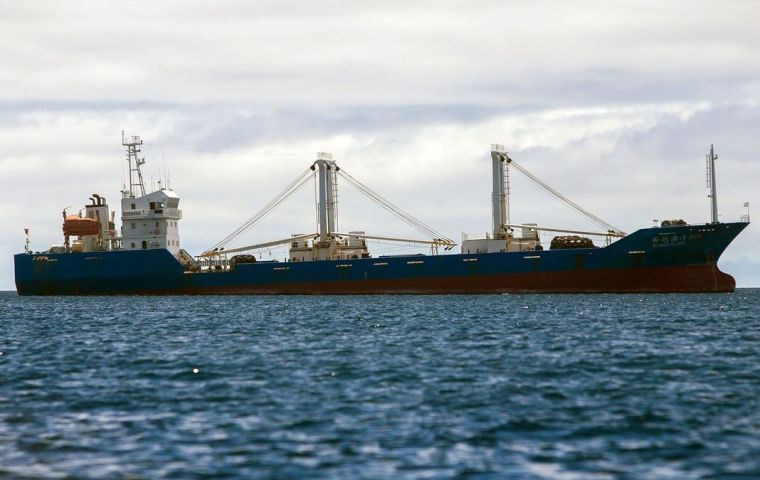MercoPress. South Atlantic News Agency
Chinese fleet next to Galapagos Islands “complying with fishing regulations” and most are jiggers
 Ecuador's officials last week said 149 of 325 vessels fishing in the ecologically sensitive Galapagos had turned off tracking systems to prevent monitoring
Ecuador's officials last week said 149 of 325 vessels fishing in the ecologically sensitive Galapagos had turned off tracking systems to prevent monitoring Chinese fishing vessels operating in the vicinity of the Galapagos Islands are complying with international fishing regulations on the high seas and none have been reported for illegal activities, China's ambassador to Ecuador said on Monday.
Ecuador's armed forces last week said 149 of some 325 vessels still fishing near the ecologically sensitive islands had turned off tracking systems to prevent monitoring of their activities.
“Except for some delays or temporary loss of satellite signal, all Chinese ships keep operating and using monitoring systems normally,” Ambassador Chen Guoyou told the international relations commission of Ecuador's congress, speaking through an interpreter.
The government of President Lenin Moreno has said that the fleet has not entered the Ecuador's territorial waters.
But environmentalists say this type of fishing allows Chinese ships to take advantage of the abundant species that leave the Galapagos Exclusive Economic Zone and cross into the high seas where Ecuador does not have jurisdiction.
Ambassador Chen said the vessels are mostly fishing for squid, with a small percentage of them fishing for tuna.
“The operating characteristics of squid fishing boats do not allow the incidental capture of sharks and other protected marine species,” he said. “China is a major fishing nation ... and it is also a responsible fishing nation.”
He said the vessels comply “strictly” with the regulations created by of the Inter-American Tropical Tuna Commission and Regional Fisheries Management Organisations.
“There is no Chinese fishing vessel” on the lists of vessels engaged in illegal, unreported and unregulated fishing published by these agencies, Mr Chen said.
Beijing has promised a policy of “zero tolerance” with the boats and has authorized Ecuadorean authorities to supervise the vessels.
It has proposed a fishing moratorium in the area near the Galapagos between September and November. Fishing fleets usually leave the area before that period.
The Ecuadorian Navy has said that ships are now moving at low speeds west of the islands, which served as the basis for British scientist Charles Darwin's theory of the evolution of species in the 19th century.




Top Comments
Disclaimer & comment rulesCommenting for this story is now closed.
If you have a Facebook account, become a fan and comment on our Facebook Page!